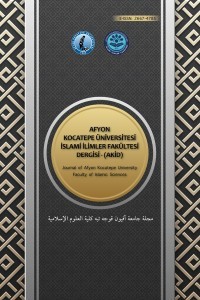
Kocatepe İslami İlimler Dergisi
Yazarlar: ["Mustafa Vacid AĞAOĞLU"]
Konular:-
DOI:10.52637/kiid.1256100
Anahtar Kelimeler:İslâm Felsefesi,Rükneddin es-Semerkandî,İnsan,Ruh,Beden
Özet: The nature of human being have been one of the most significant topics throughout the history of science and thought. Kalam tradition has analyzed the human being primarily along the axes of the soul, free will, beginning, and ending. In the process following the transfer of the ancient philosophical accumulation to the Islamic world, and especially after al-Fārābī (d. 950), human beings have been analyzed in many aspects such as psychology, socio-political theory, and eschatology in line with the demands of the philosophical perspective. The Sufi tradition, on the other hand, has analyzed the human being from its own unique perspective, namely within the framework of the discovery method and struggle. Rukn al-Dīn al-Samarqandi (born in 1301), one of the late Māturīdī and Hanafī scholars who wrote in a variety of fields including kalam, tafsir, mysticism, and usul al-fiqh, gave the issue of the human being special importance and wrote a tractate titled “]Risâlat al-uhrâ[ fî ma‘rifat al-insân” on the topic. Al-Samarqandi, who was also influenced by the Sufi tradition, analyzes the human soul extensively in this work. In addition, the author discusses Allah's existence and making through knowledge and recognition of humanity. This study is divided into two sections. The first section, which includes examination and analysis, consists of three subheadings: the general characteristics of the tractate, namely the name of the tractate and the author's attribution, the introduction of the manuscripts, and the method used in the analysis. The other two sections comprise the subject and content analyses of the tractate. The second section consists of a critical textual edition of the aforementioned tractate, which is the primary focus of our research and is still in manuscript form. Within the scope of the second section, i.e. our investigation analysis, a total of four different manuscript copies were accessed (one of which we preferred because the master copy is located in Bursa and the other three copies are located at the Istanbul Suleymaniye Library). In the initial step, the construction of the analyzed text was provided on the sole copy (the main copy) that contains the date and the author's name. In the subsequent stages, analysis and a comparison with the remaining three copies were performed. Although some of Rukn al-Dīn al-Samarqandī's explanations in this tractate give the impression that he was himself sufi-minded, he presented his ideas from a theologian's perspective. Because he adheres to the kalam tradition, he argues that the soul is a "body," that it enters the body (mold), and that it is temporal and spatial like other living things. Again, as a theologian, adhering to his tradition, al-Samarqandī emphasizes that the afterlife will be both spiritual and physical. In this context, he criticizes the philosophers who assert that the afterlife will be solely spiritual, arguing that their views are incorrect. In the first chapter of his tractate, al-Samarqandi splits it into five divisions and examines the exegesis of the hadith “He who knows his existence knows his Lord”. He argues in the second chapter that the animal spirit is an elegant body. Even if the organs are unknown, any human being can say "I am the human soul that can comprehend" in the third chapter, according to the author. In the fourth chapter, he gives his thoughts and explanations on the human form and soul, and in the fifth chapter, he explains his conception of God through the theme that “whoever understands the miniature universe (human) understands God”. Thus, in “]Risâlat al-uhrâ[ fî ma‘rifat al-insân”, Rukn al-Dīn al-Samarqandī analyzes the human soul, explains that it is a delightful matter, and asserts that the afterlife will be both spiritual and physical. Furthermore, al-Samarqandī establishes a connection between knowing one's soul and knowing Allah. In addition, al-Samarqandī, who views the human being as a miniature universe (microcosmos), states that knowing the various selections and wisdoms it contains is a prerequisite for understanding and realizing Allah.